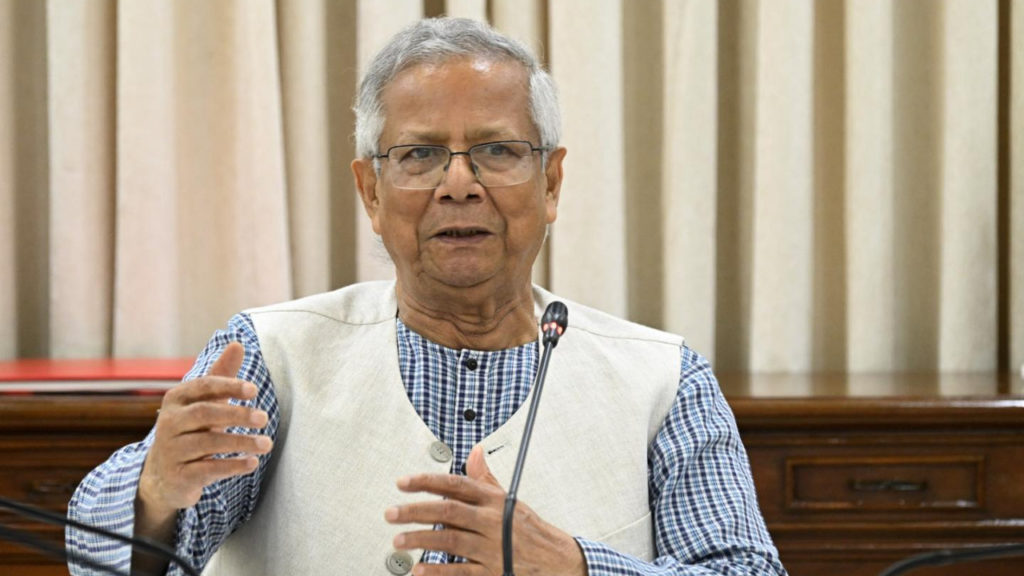National Desk
Chief Adviser Professor Muhammad Yunus has called for expediting the integrated development of Bangladesh’s road, rail, air, and waterways while ensuring that nature, the environment, and rivers remain unharmed.
On Sunday (November 2), he made the call during an inter-ministerial meeting on the marginal evaluation and strategic planning of the “Central Integrated Multimodal Transport Sector Master Plan of Bangladesh,” held at the State Guest House Jamuna in Dhaka. The information was confirmed through a press release issued by the Chief Adviser’s Press Wing.
“We must pursue this development without harming the environment. The river must not be damaged, the water must be kept calm, and we must remember that water is a vital part of our lives,” Professor Yunus said. He noted that the country’s current transport system remains disorganized and cautioned that, unless brought under proper management soon, it may become a burden on the economy.
The meeting was attended by Planning Adviser Dr. Wahiduddin Mahmud, Road Transport, Bridges and Railways Adviser Muhammad Fouzul Kabir Khan, Civil Aviation and Tourism Adviser Sheikh Bashir Uddin, Shipping Adviser Brig. Gen. (Retd.) Dr. M. Sakhawat Hossain, Local Government, Rural Development and Cooperatives Adviser Asif Mahmud Sajib Bhuiyan, Chief Adviser’s Special Assistant on Road, Transport, Bridges and Railways Dr. Sheikh Moinuddin, Executive Chairman of the Bangladesh Investment Development Authority (BIDA) and Bangladesh Economic Zones Authority (BEZA) Chowdhury Ashik Mahmud Bin Harun, and Chief Adviser’s Special Assistant on the Ministry of Posts, Telecommunications and Information Technology Faiz Ahmad Taiyeb, among other senior officials.
During the session, the Roads and Highways Department presented a preliminary strategic plan, prepared in coordination with relevant ministries. The plan outlines how the overall transport system can be improved through better coordination among existing communication networks and by implementing necessary reforms and expansions.
According to the presentation, effective utilization and limited expansion of the country’s existing roadways, railways, and waterways could significantly enhance the performance of the transport sector.
Commending the officials for formulating a coordinated plan, Professor Yunus described it as a strong initial framework that requires effective implementation. He emphasized that the plan should be designed with the nation’s economic prosperity in mind, considering not only domestic connectivity but also regional and global transport integration.
“When we think of rivers as a means of communication, we must remember that they are our lifeline,” he reiterated, stressing the importance of balancing development with environmental preservation.
Chief Adviser’s Special Assistant Dr. Sheikh Moinuddin stated that efforts are underway to develop a comprehensive model for the transport sector that will strengthen the country’s economic foundation.
Planning Adviser Dr. Wahiduddin Mahmud pointed out that swift action is needed in areas where regional connectivity can be achieved by constructing just a few small roads.
Local Government Adviser Asif Mahmud Sajib Bhuiyan informed the meeting that a “Planners’ Wing” is being established under the Local Government Division to make development initiatives more structured and strategic.
BIDA and BEZA Chairman Chowdhury Ashik Mahmud Bin Harun announced that three new ports will be operational in Chattogram by 2030. “In view of this, immediate initiatives must be taken to ensure smooth and efficient road connectivity with these ports,” he added.
Advisers and senior officials present at the meeting agreed that a coordinated transport system — integrating road, rail, air, and waterways — would significantly contribute to Bangladesh’s economic growth. They observed that once implemented, the plan would help reduce domestic transport costs, enhance regional trade, and improve connectivity between major industrial hubs and the capital.


